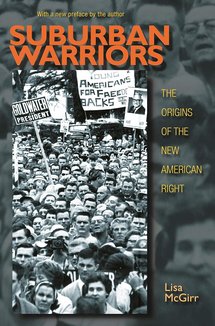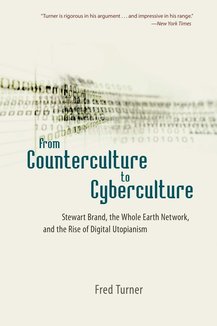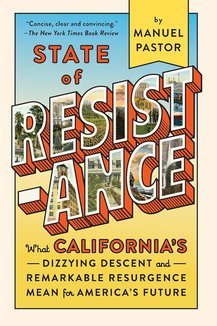Recommended Books

Suburban Warriors: The Origins of the New American Right - Updated Edition (Politics and Society in Modern America)
Author:
Lisa McGirr
ISBN 13:
978-0691165738
In the early 1960s, American conservatives seemed to have fallen on hard times. McCarthyism was on the run, and movements on the political left were grabbing headlines. The media lampooned John Birchers's accusations that Dwight Eisenhower was a communist puppet. Mainstream America snickered at warnings by California Congressman James B. Utt that "barefooted Africans" were training in Georgia to help the United Nations take over the country. Yet, in Utt's home district of Orange County, thousands of middle-class suburbanites proceeded to organize a powerful conservative movement that would land Ronald Reagan in the White House and redefine the spectrum of acceptable politics into the next century. Suburban Warriors introduces us to these people: women hosting coffee klatches for Barry Goldwater in their tract houses; members of anticommunist reading groups organizing against sex education; pro-life Democrats gradually drawn into conservative circles; and new arrivals finding work in defense companies and a sense of community in Orange County's mushrooming evangelical churches. We learn what motivated them and how they interpreted their political activity. Lisa McGirr shows that their movement was not one of marginal people suffering from status anxiety, but rather one formed by successful entrepreneurial types with modern lifestyles and bright futures. She describes how these suburban pioneers created new political and social philosophies anchored in a fusion of Christian fundamentalism, xenophobic nationalism, and western libertarianism. While introducing these rank-and-file activists, McGirr chronicles Orange County's rise from "nut country" to political vanguard. Through this history, she traces the evolution of the New Right from a virulent anticommunist, anti-establishment fringe to a broad national movement nourished by evangelical Protestantism. Her original contribution to the social history of politics broadens―and often upsets―our understanding of the deep and tenacious roots of popular conservatism in America.

From Counterculture to Cyberculture: Stewart Brand, the Whole Earth Network, and the Rise of Digital Utopianism
Author:
Fred Turner
ISBN 13:
978-0226817422
In the early 1960s, computers haunted the American popular imagination. Bleak tools of the cold war, they embodied the rigid organization and mechanical conformity that made the military-industrial complex possible. But by the 1990s—and the dawn of the Internet—computers started to represent a very different kind of world: a collaborative and digital utopia modeled on the communal ideals of the hippies who so vehemently rebelled against the cold war establishment in the first place. From Counterculture to Cyberculture is the first book to explore this extraordinary and ironic transformation. Fred Turner here traces the previously untold story of a highly influential group of San Francisco Bay–area entrepreneurs: Stewart Brand and the Whole Earth network. Between 1968 and 1998, via such familiar venues as the National Book Award–winning Whole Earth Catalog , the computer conferencing system known as WELL, and, ultimately, the launch of the wildly successful Wired magazine, Brand and his colleagues brokered a long-running collaboration between San Francisco flower power and the emerging technological hub of Silicon Valley. Thanks to their vision, counterculturalists and technologists alike joined together to reimagine computers as tools for personal liberation, the building of virtual and decidedly alternative communities, and the exploration of bold new social frontiers. Shedding new light on how our networked culture came to be, this fascinating book reminds us that the distance between the Grateful Dead and Google, between Ken Kesey and the computer itself, is not as great as we might think.

State of Resistance: What California’s Dizzying Descent and Remarkable Resurgence Mean for America’s Future
Author:
Manuel Pastor
ISBN 13:
978-1620975572
A leading sociologist's brilliant, revelatory argument that the future of politics, work, immigration, and more can be found in California Lauded by James Fallows on the front page of the New York Times Book Review as "concise, clear, and convincing" upon its hardcover publication, State of Resistance makes the case for honestly engaging racial anxiety in order to address our true economic and generational challenges, renewing our commitment to public investments, cultivating social movements and community organizing, and more. Once upon a time, any mention of California triggered unpleasant reminders of Ronald Reagan and right-wing tax revolts, ballot propositions targeting undocumented immigrants, and racist policing that sparked two of the nation's most devastating riots. In fact, California confronted many of the challenges the country faces now―decades before the rest of us. As white residents became a minority and job loss drove economic uncertainty, California had its own Trump moment twenty-five years ago but has become increasingly blue over each of the last seven presidential elections. Today, California is leading the way on addressing climate change, low-wage work, immigrant integration, overincarceration, and more. Pastor expertly reveals how the Golden State did it. And as Neera Tandeen, president and CEO of the Center for American Progress, said, " State of Resistance paints a brilliant picture of how our generation can seize the opportunity to forge a more inclusive, just, and prosperous America for every family."